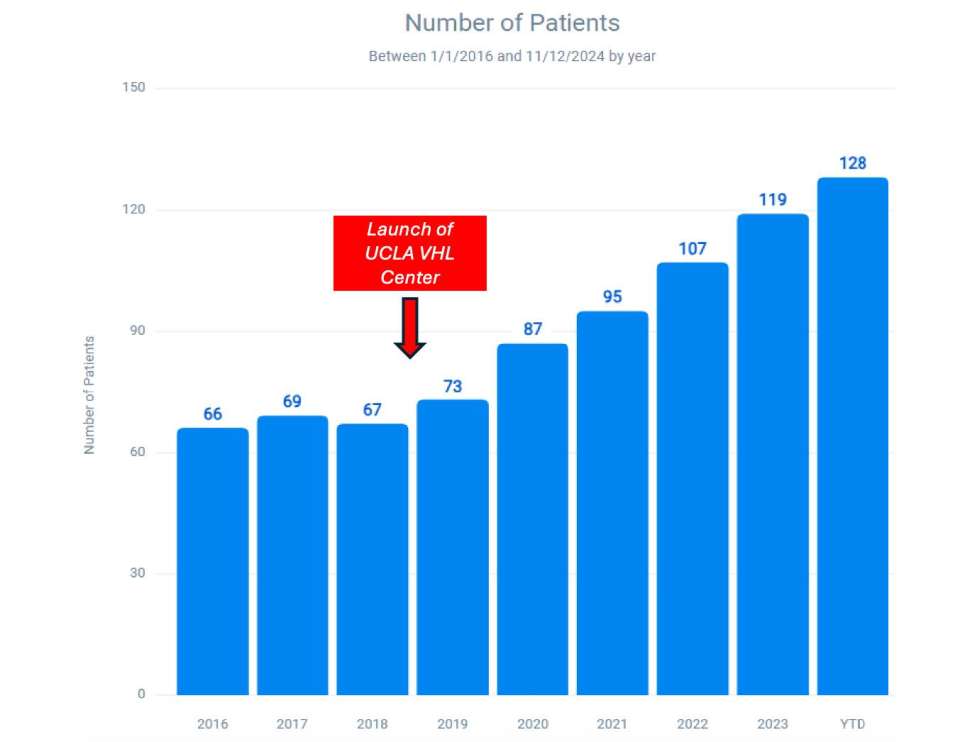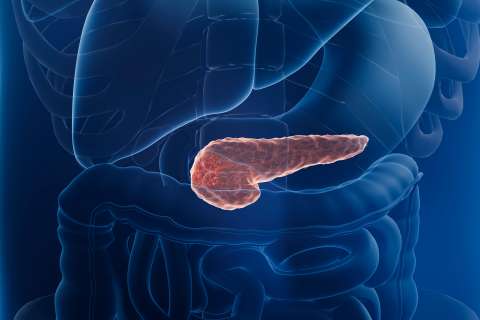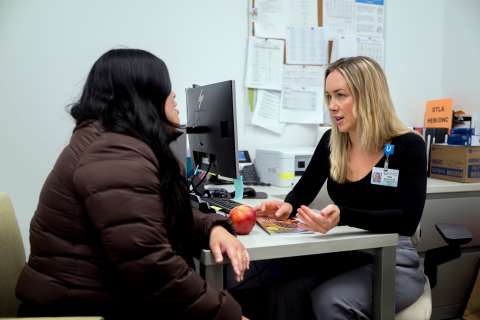Hollie Williamson was a sophomore in high school when doctors discovered she had a brain tumor — the first of many tumors Williamson would have to deal with throughout her life.
While it was upsetting news to hear, it wasn’t a complete shock to Williamson or her family. Her mother had been diagnosed with von Hippel-Lindau disease (VHL), a rare genetic disorder that significantly increases the risk of tumors in specific areas of the body such as the eyes, spine, brain and internal organs. A person with a parent with VHL has a 50% chance of inheriting the disease.
"When I found out I had a brain tumor, we all knew it was VHL," Williamson, now 45, recalled. "My mom was diagnosed with VHL when she was a teenager, and we later learned it was genetic. We just weren’t sure if I’d inherit it too."
VHL, which affects about 1 in 36,000 people, is caused by a mutation in the VHL gene, which normally regulates cell growth. When the normal VHL gene is lost, it can cause cells to multiply uncontrollably, which leads to the growth of tumors and cysts throughout the body. These growths, though sometimes noncancerous, can still be dangerous, causing severe pain and complications by putting pressure on surrounding tissues.
Since her first surgery, Williamson has had to brace herself for each new tumor that appeared. For her, this has created an ongoing cycle of surveillance, surgery, and recovery, but she refuses to let it control her life.
“I didn’t want my life to always be about being sick and having this illness,” said Williamson. “So, I would have surgery and just move on with my life.”
Williamson didn’t let her condition hold her back. She pursued higher education and attended graduate school in San Francisco to study psychology.
A multidisciplinary team of experts
After receiving her graduate degree, Williamson moved down to Kern County to start her career as a school psychologist. She decided to continue her medical care at UCLA Health, which is home to one of the largest VHL treatment programs in the western United States. It’s also one of only two hospitals in California that is designated as a Comprehensive Clinical Care Center by the national VHL Alliance.
The expert team, led by Dr. Brian Shuch, professor of urology at the David Geffen School of Medicine at UCLA, provides highly specialized, comprehensive, multispecialty care for every patient with VHL and their family members. The program brings together a multidisciplinary team of experts from the departments of urology, ophthalmology, neurosurgery, medicine, surgical oncology, gastroenterology, head and neck surgery, genetic counseling, neurology, radiology, nuclear medicine and the UCLA Health Jonsson Comprehensive Cancer Center.

Since the re-launch of the program after Dr. Shuch’s arrival in 2018, the number of patients with VHL disease receiving care at UCLA annually has doubled, from about 65 to nearly 130 patients (Figure 1). The program is now considered to be the fifth largest in the United States and the leading center on the West Coast for VHL care.
The specialists regularly discuss the best treatment options for each patient to ensure they get the best care possible.
“Our VHL program brings together a multidisciplinary team of specialists who are leaders in their fields with a strong background managing this disease,” said Dr. Shuch, who is also an investigator at the UCLA Health Jonsson Comprehensive Cancer Center. “We have experts across various areas, from retinal disease to neurosurgery, who are dedicated to tackling the complex challenges our patients face. It truly takes a village to care for these patients, and we’re fortunate to have a team that collaborates seamlessly to provide the best possible care.”
“Our approach to treating VHL is not just about addressing the tumors, but about improving our patients’ overall quality of life,” said Dr. Isaac Yang, professor of neurosurgery at the David Geffen School of Medicine and member of the UCLA Health Jonsson Comprehensive Cancer Center. “By collaborating across specialties, we can provide the most effective care while also minimizing the physical and emotional toll that comes with multiple surgeries and treatments. It's about giving our patients the best possible outcomes.”
For Williamson, this approach has been lifesaving. She has faced many health challenges due to her condition and so far has had 30-40 tumors identified throughout her body. While at UCLA she has had numerous procedures, including undergoing multiple brain and spine surgeries and a Whipple procedure for her pancreas.
Williamson also developed kidney cancer, one of the most prevalent cancers among individuals with VHL. Approximately 70% of VHL patients will experience this type of cancer at some point in their lives.
"What’s great about UCLA is that all my VHL doctors are in one place, working together seamlessly," said Williamson. "Whether it’s Dr. Isaac Yang, my neurosurgeon, or Dr. Shuch, my kidney specialist, they can all see my MRI results and coordinate my care. It makes a huge difference knowing that I’m getting comprehensive, integrated treatment. Plus, they genuinely care about how I’m doing and how I’m being treated, and that makes a big difference.”
New hope
While surgery has been the main treatment option for people with VHL, there is now new hope for managing the condition without surgery.
The U.S. Food and Drug Administration recently approved belzutifan, the first-ever drug to treat adults who have brain/spinal hemangioblastomas, pancreatic neuroendocrine tumors, and renal cell carcinomas associated with VHL that need treatment but do not require immediate surgery. The drug helps avoid or delay surgery by shrinking tumors and patients have been able to stay on therapy for years. Dr. Shuch expects it to significantly improve the outlook for patients like Williamson.
“Having participated in prior therapeutic trials for patients with VHL disease, the prior generation of agents were poorly tolerated, but belzutifan allows patients to maintain a high quality of life with minimal side effects,” Dr. Shuch said. “I am treating over 20 patients with this therapy, many of which have avoided surgery and maintain excellent quality of life.”
Dr. Michael Gorin, Harold and Pauline Price Chair in Ophthalmology at the UCLA and Jules Stein Eye Institute, has been treating patients with VHL for more than three decades and plays a central role in the program.
“There is an ongoing need for careful surveillance and treatment of retinal hemangioblastomas to prevent vision loss,” Dr. Gorin said. “We have seen dramatic responses of previously untreatable lesions to bezultifan as well as improving the treatment of larger lesions with laser and/or intraocular vitreoretinal surgery.”
Williamson recently started this treatment and is enjoying spending quality time with her family, relaxing and continuing her work with students with special needs.
"I couldn’t have kept working this long without the incredible care from the doctors at UCLA,” said Williamson. “Their expertise has made all the difference, and I’m so grateful for everything they’ve done for me."
Take the Next Step
Learn more about UCLA’s Comprehensive Clinical Care Center for von Hippel-Lindau disease.






